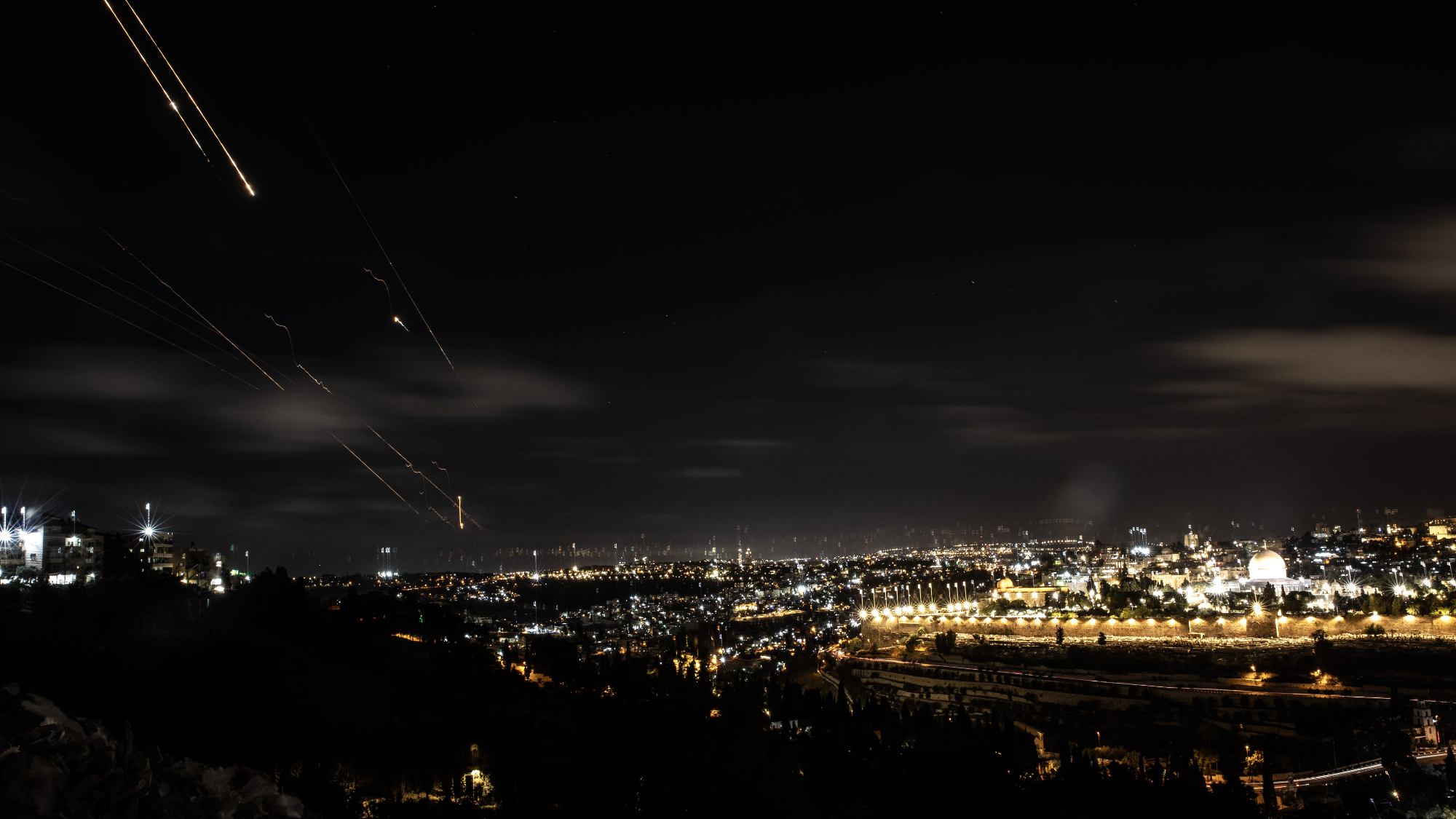Israel vows revenge for Iran's thwarted attack
Iran's attack was in retaliation for Israel's killing of Iran military leaders, plus members of Tehran-backed Hezbollah and Hamas


A free daily email with the biggest news stories of the day – and the best features from TheWeek.com
You are now subscribed
Your newsletter sign-up was successful
What happened
Iran launched more than 180 ballistic missiles at Israel Tuesday, targeting several military bases and the headquarters of the Mossad intelligence service in Tel Aviv. Iran said the attack was in retaliation for Israel's killing of leaders of Iran's military and Tehran-backed militias Hezbollah and Hamas. Two people were lightly wounded in Israel and a Palestinian man was killed by falling shrapnel in the West Bank.
Who said what
Iran scored a "small number of hits" in central and southern Israel, said Israeli military spokesperson Daniel Hagari, but the "majority of the incoming missiles were intercepted by Israel and a defensive coalition led by the United States." U.S. National Security Adviser Jake Sullivan said Iran's attack was a "serious escalation" that would have "severe consequences," though it "appears to have been defeated and ineffective." By midnight Tuesday night Israelis were told they could leave their bomb shelters.
"Iran made a big mistake tonight — and it will pay for it," Israeli Prime Minister Benjamin Netanyahu said. Iranian President Masoud Pezeshkian said in a post on X that Tehran was "not seeking war but it will stand firmly against any threats." The missile barrage was "only a small glimpse of our powers," he added. "Do not enter into a war with Iran."
What next?
Israel will want to show it can "strike any target in Iran," but it should tread carefully, former U.S. intelligence officer Norman Roule said to The Wall Street Journal. "A war with Iran would require the political, economic and military support, if not participation by the United States," and "Israel no doubt recognizes that Washington has no interest in engaging in such a conflict."
The Week
Escape your echo chamber. Get the facts behind the news, plus analysis from multiple perspectives.

Sign up for The Week's Free Newsletters
From our morning news briefing to a weekly Good News Newsletter, get the best of The Week delivered directly to your inbox.
From our morning news briefing to a weekly Good News Newsletter, get the best of The Week delivered directly to your inbox.
A free daily email with the biggest news stories of the day – and the best features from TheWeek.com
Rafi Schwartz has worked as a politics writer at The Week since 2022, where he covers elections, Congress and the White House. He was previously a contributing writer with Mic focusing largely on politics, a senior writer with Splinter News, a staff writer for Fusion's news lab, and the managing editor of Heeb Magazine, a Jewish life and culture publication. Rafi's work has appeared in Rolling Stone, GOOD and The Forward, among others.
-
 ‘Restaurateurs have become millionaires’
‘Restaurateurs have become millionaires’Instant Opinion Opinion, comment and editorials of the day
-
 Earth is rapidly approaching a ‘hothouse’ trajectory of warming
Earth is rapidly approaching a ‘hothouse’ trajectory of warmingThe explainer It may become impossible to fix
-
 Health insurance: Premiums soar as ACA subsidies end
Health insurance: Premiums soar as ACA subsidies endFeature 1.4 million people have dropped coverage
-
 Witkoff and Kushner tackle Ukraine, Iran in Geneva
Witkoff and Kushner tackle Ukraine, Iran in GenevaSpeed Read Steve Witkoff and Jared Kushner held negotiations aimed at securing a nuclear deal with Iran and an end to Russia’s war in Ukraine
-
 ‘The mark’s significance is psychological, if that’
‘The mark’s significance is psychological, if that’Instant Opinion Opinion, comment and editorials of the day
-
 ‘Bad Bunny’s music feels inclusive and exclusive at the same time’
‘Bad Bunny’s music feels inclusive and exclusive at the same time’Instant Opinion Opinion, comment and editorials of the day
-
 Trump links funding to name on Penn Station
Trump links funding to name on Penn StationSpeed Read Trump “can restart the funding with a snap of his fingers,” a Schumer insider said
-
 Trump reclassifies 50,000 federal jobs to ease firings
Trump reclassifies 50,000 federal jobs to ease firingsSpeed Read The rule strips longstanding job protections from federal workers
-
 Supreme Court upholds California gerrymander
Supreme Court upholds California gerrymanderSpeed Read The emergency docket order had no dissents from the court
-
 700 ICE agents exit Twin Cities amid legal chaos
700 ICE agents exit Twin Cities amid legal chaosSpeed Read More than 2,000 agents remain in the region
-
 Is the Gaza peace plan destined to fail?
Is the Gaza peace plan destined to fail?Today’s Big Question Since the ceasefire agreement in October, the situation in Gaza is still ‘precarious’, with the path to peace facing ‘many obstacles’
